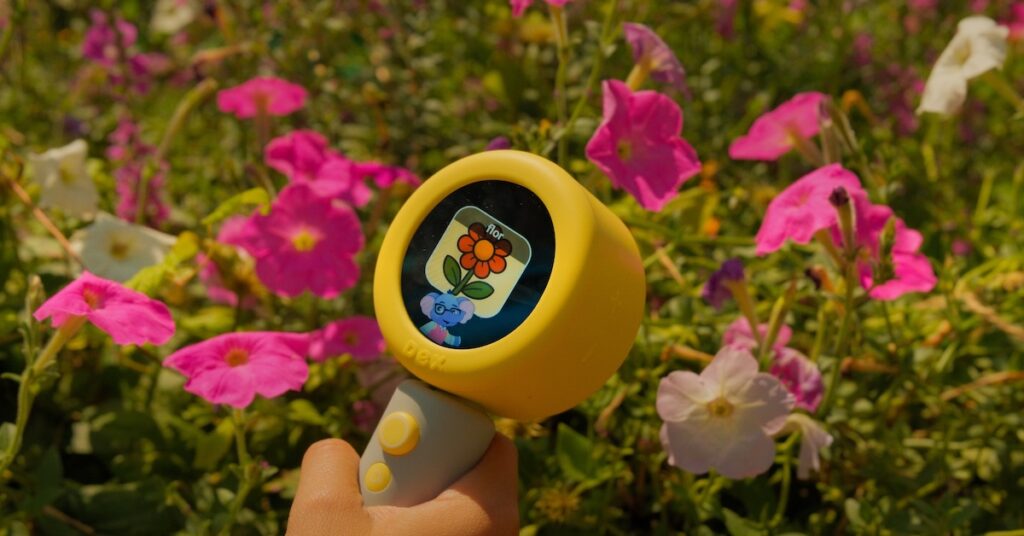Three parents — Reni Cao, Xiao Zhang, and Susan Rosenthal — were worried about their children’s screen time, so they left their tech jobs to create a product that encourages children to engage with the real world while also helping them learn a new language. Their move has paid off, as the company recently raised $4.8 million in funding.
The newly launched gadget is called Dex and resembles a high-tech magnifying glass with a camera lens on one side and a touchscreen on the other. When kids use the device to take pictures of objects, the AI utilizes image recognition technology to identify the object and translate the word into the selected language. It also features interactive story lessons and games.
While kid-focused language learning apps like Duolingo Kids exist, Dex argues that it takes a more engaging approach that emphasizes hands-on experiences, allowing children to immerse themselves in the language.
“We’re trying to teach authentic language in the real world in a way that’s interactive,” Cao told TechCrunch. “The kids are not only listening or doing what they are told to do, but rather, they are actually thinking, creating, interacting, running around, and just being curious about things, and acquire the necessary language associated with those concepts and objects.”
Dex is designed for kids ages 3 to 8 years old and currently supports Chinese, French, German, Hindi, Italian, Japanese, Korean, and Spanish. It also offers support for 34 dialects, including Egyptian Arabic, Taiwanese Mandarin, and Mexican Spanish.
In addition to object recognition, Dex features a library of interactive stories that encourage children to actively participate in the narrative. As the story unfolds, kids are prompted to respond, such as greeting characters in the language they are learning.
The device comes with a dedicated app for parents to see a detailed overview of their child’s progress, including the vocabulary words they’ve learned, the stories they’ve engaged with, and the number of consecutive days they’ve used Dex.
Techcrunch event
San Francisco
|
October 27-29, 2025
Additionally, Dex is currently developing a feature that allows kids to ask an AI chatbot questions and engage in free-form conversations. This feature is already available to some testers, but the company admits it isn’t ready for a wider rollout. Parents might also be cautious about introducing AI chatbots to their children.
During our testing of Dex, we had concerns about the possibility of a child learning inappropriate words. Cao assured us that “rigid safety prompts” are included whenever the large language model is used across vision, reasoning, and text-to-speech.
He said, “We have an always-on safety agent that evaluates conversations in real time and filters conversations with a safe stop word list. The agent will suppress conversation if any of the stop words are mentioned, including but not limited to those related to sexuality, religion, politics, etc. Parents will soon be able to further add to personalized stop-word lists.”
Plus, it said that the AI is trained using vocabulary standards similar to those found in Britannica Kids and other children’s encyclopedias.
In our testing, the AI successfully ignored topics related to nudity. However, it did recognize and accurately translate the term “gun,” something parents should consider when purchasing the device.
In response to questions about our findings and uncertainty surrounding legal regulations, Cao told us, “Regulation-wise, I’m not worried, but I do think this presents a concern, especially among [some] parents.” He added that these concerns have pushed the company to soon introduce an option in settings to filter out specific words, such as guns, cigarettes, vape pens, fireworks, marijuana, and beer bottles.
Dex also has a zero data retention policy. While this means there’s no risk of sensitive or personal images being stored, one downside could be that parents are left in the dark about the type of images their kids may be capturing. The startup informed us that parents can see a complete list of learned words via Dex’s app.
Dex is also actively working toward obtaining COPPA Safe Harbor status, which would make it compliant with the Children’s Online Privacy Protection Act.

The funding round was led by Parable, with participation from Eduardo Vivas (Curated co-founder), UpscaleX, ClayVC, and EmbeddingVC. Notable angel investors include Pinterest founder Ben Silbermann, Lilian Weng, who is the former head of safety at OpenAI, and Richard Wong (ex-Coursera).
The device is priced at $250, which feels steep for a product designed for children. However, Dex positions itself as a more affordable alternative to hiring a tutor, which can charge up to $80 per hour, or attending a language immersion school, which can cost several hundred to even thousands of dollars.
Dex says that hundreds of families have already purchased the device.
This story was updated after publication.
We’re always looking to evolve, and by providing some insight into your perspective and feedback into TechCrunch and our coverage and events, you can help us! Fill out this survey to let us know how we’re doing and get the chance to win a prize in return!

